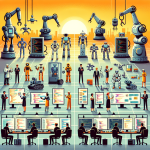In an era where technology is evolving at an unprecedented rate, customer service is undergoing a significant transformation. No longer confined to phone calls and face-to-face interactions, customer service representatives (CSRs) are now navigating a landscape enriched with advanced technologies—from chatbots and AI to omnichannel communication platforms. This article delves into how technology is reshaping the roles of customer service representatives, enhancing the customer experience, and forecasting what the future may hold.
The Rise of Automation and AI
One of the most significant trends affecting customer service is the use of automation and artificial intelligence (AI). Chatbots and virtual assistants are now capable of handling a variety of customer inquiries— from answering FAQs to troubleshooting basic issues—24/7. This allows CSRs to focus on more complex problems and engage with customers in a more meaningful way.
Benefits of AI Integration
- Increased Efficiency: Automated systems can handle multiple customer queries simultaneously, reducing wait times and improving service efficiency.
- 24/7 Availability: Automated solutions allow companies to provide support round-the-clock, catering to customers in different time zones.
- Data-Driven Insights: AI can analyze customer interactions and generate insights that help organizations understand customer needs and preferences better.
The Shift to Omnichannel Support
Customers today expect seamless interactions across multiple channels—whether it’s via social media, email, chat, or phone. Technology enables CSRs to provide omnichannel support, ensuring that customer queries are resolved no matter how they come in.
Implications for Customer Service Representatives
- Unified Communication Tools: CSRs now utilize integrated platforms that consolidate all customer communications, allowing for a more coherent and efficient service experience.
- Skill Development: Representatives must become adept at using various tools and technologies, creating a demand for continuous learning and skill enhancement.
Enhanced Personalization
Tech innovations allow for tailored customer experiences, as systems analyze historical data and the customer journey. This personalization can help CSRs engage with customers on a deeper level, fostering loyalty and satisfaction.
The Role of Data
- Customer Profiles: By utilizing customer data, CSRs can personalize interactions, recommend products, and resolve issues more effectively.
- Predictive Analytics: Businesses can forecast future customer needs based on past behaviors, allowing CSRs to proactively address concerns before they arise.
The Human Touch in a Digital Age
While technology greatly enhances efficiency and effectiveness, the human element in customer service cannot be overlooked. Complex issues, emotional interactions, and nuanced conversations often require a human touch that automated systems cannot provide.
Balancing Technology and Empathy
- Training and Development: Organizations will need to invest in training programs that help CSRs focus on emotional intelligence, problem-solving, and communication skills.
- Human Oversight: Maintaining human oversight in situations where technology falls short ensures that customers feel heard and valued.
Preparing for the Future
As technology continues to evolve, so too will the role of customer service representatives. Future CSRs may engage with customers using advanced technologies such as augmented reality (AR) or virtual reality (VR) to explain products or troubleshoot problems in real-time.
Skills for Tomorrow’s CSRs
To thrive in this changing environment, customer service representatives will need to develop:
- Technical Proficiency: Familiarity with new tools and technologies will be essential.
- Analytical Skills: The ability to interpret customer data and draw actionable insights will become increasingly important.
- Adaptability: The capacity to learn and adjust to new technologies and processes is crucial in a rapidly evolving landscape.
Conclusion
The future of customer service is not solely about replacing human representatives with machines; it’s about leveraging technology to enhance the human experience. As automation and AI streamline processes, customer service representatives are evolving into skilled professionals equipped to handle complexities with empathy and insight. By embracing these changes and preparing for the future, organizations can foster a customer service environment that not only meets but exceeds the expectations of today’s consumers. The result is a win-win: satisfied customers and empowered representatives, all working together in an increasingly interconnected world.




